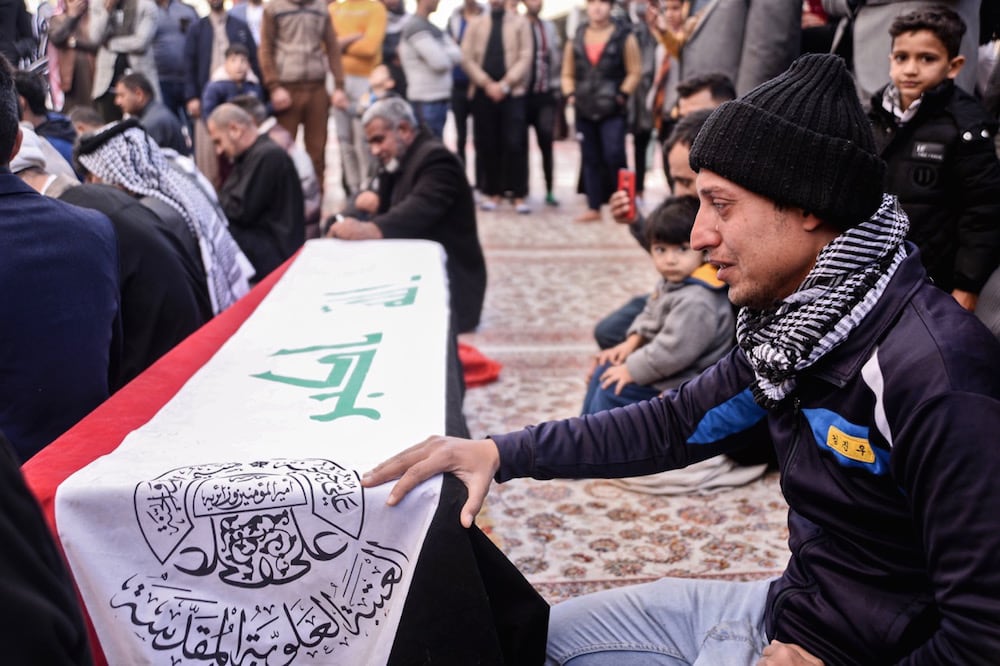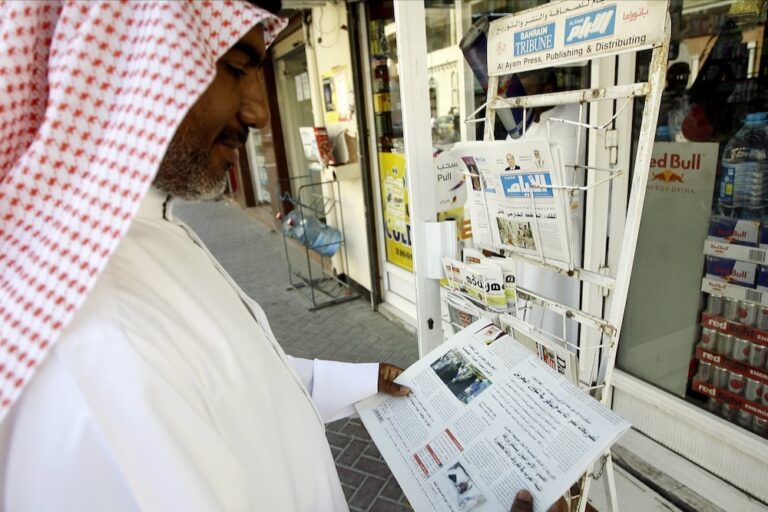January in Middle East and North Africa: A roundup of key free expression news, based on IFEX member reports.
Egypt’s cold prisons and legal entanglements
The death of American-Egyptian activist Mustafa Kassem last month while in custody has called attention to the dire state of Egypt’s prison system, and the horrors it continues to inflict on dissidents and human rights defenders. Serving a 15-year sentence for his participation in the 2013 Rabaa sit-in, Kassem, a diabetic, staged a hunger strike in the days leading up to his death to protest the inhumane conditions of his confinement.
Kassem was not alone, as several other prisoners died last month due to medical negligence, prompting open-ended hunger strikes throughout various notorious prisons, and calls from rights groups for inspections to be conducted by international bodies. According to the Cairo Institute for Human Rights Studies (CIHRS), roughly 917 prisoners have died between 2013 and 2019, 677 due to medical negligence, and 136 from torture.
Hundreds of detainees remain in imminent danger, having been subjected to torture, medical neglect, and given insufficient food, and throughout the winter many have been forced to sleep on the cold ground after being denied warm clothes, blankets and mattresses. A social media campaign using the hashtag “cold cells” (#برد الزنازين) was launched to bring attention to the situation.
Other legal practices employed by Egyptian prosecutors to rein in peaceful critics include Case no. 488, which has grouped together many dissidents and charged them collectively with “collaborating with a terrorist organization to achieve its goals”, “spreading false news”, and “using social media to publish false rumours”. Initiated in February 2019, rights groups in the country have called it “a widening net targeting anyone critical of the Egyptian government, including researchers, politicians, human rights defenders, journalists, lawyers, and social media activists.”
Media in the crosshairs
Following November’s raid on the offices of independent media outlet Mada Masr, authorities have continued their pressure on media organizations in the country. Security forces raided the Cairo offices of Turkish Anadolu News Agency, arresting at least four staffers, charging them with spreading false news and working with the outlawed Muslim Brotherhood Group to “distort the image of Egypt”.
While charging journalists and media organizations with working with banned groups the state considers to be “terrorist entities” is not new, Egypt’s parliament has recently moved to codify the practice into law. Amendments to the country’s terrorism law regulating its list of associations and organizations designated as supporting terrorism activity, saw the list’s expansion to include: TV channels, print media, radio stations and social media, both inside and outside the country.
Iraq: Protesters and journalists targeted
In defiance of the escalating violence, protests raged on in Iraq with anti-government demonstrators demanding an upheaval of the governing political class. Following November’s resignation of Prime Minister Adel Abdul Mahdi, protesters rejected his newly appointed successor, Mohammed Tawfiq Allawi, dubbing him a “stooge of the political elite” despite his appeals for their support in a video posted on Twitter.
Since their launch in October 2019, the ongoing protests have resulted in at least 650 deaths and over 20,000 injuries, with security forces, militias, and unidentifiable gunmen targeting peaceful demonstrators, including students, human rights defenders, as well as women and children on the front lines, as reported by the Gulf Centre for Human Rights (GCHR). Last month, security forces were documented using live ammunition and burning protester tents in city squares, in an effort to expel demonstrators from public spaces.
Journalists and media outlets have also been ensnared in the violence, with unidentified gunmen assassinating Dijlah TV journalists Ahmad Abdel Samad and his colleague Safaa Ghali while they were covering protests in Basra. Calls for investigations by Iraqi journalists and rights groups seem to have fallen on deaf ears, with the Iraqi broadcaster seeing a raid of its Baghdad offices by security forces, and a one-month suspension of its broadcast from Amman by Jordanian authorities.
“Covering protests in Iraq and, in particular, drawing attention to the methods that the security forces use to suppress them, now means putting your life in danger,” said Sabrina Bennoui, the head of Reporters Without Borders (RSF) Middle East desk. “Iraqi journalists keep on being killed and their murders go unpunished because the authorities do not conduct any serious investigations.”
Saudi Arabia: Sportswashing and hacking allegations
Reform efforts in Saudi Arabia over the past year have been overshadowed by a sweeping campaign of repression, said Human Rights Watch (HRW) in its 2020 World Report. Despite removing travel restrictions for women over 21, changes to the male guardianship system, and allowing women to drive, HRW notes that dozens of activists remain in prison, including prominent women’s rights defenders, and least 20 intellectuals and writers arrested in April and November 2019 alone.
“It’s a cruel irony that Saudi women are enjoying new freedoms while some of those who fought hardest for them remain behind bars or facing blatantly unfair trials,” said Michael Page, deputy Middle East director at HRW.
Imprisoned critics include human rights lawyer Walid Abu Al-Khair and his client, prominent blogger Raif Badawi, as well as human rights defender Khaled Al-Omair – all of whom went on a recent hunger strike to protest their ill-treatment in prison, including their total isolation in solitary confinement. Al-Khair was transferred to a hospital after his health deteriorated, while Al-Omair announced his hunger strike in a letter written on a piece of tissue, which was leaked from the maximum-security Al-Ha’ir prison where he is held.
“I am not a terrorist, and have done nothing more than simply express the opinion that our country needs a new constitution,” wrote Al-Omair, who has been in prison without charges since 2018 after filing a complaint with the Saudi Royal Court accusing an officer of the General Investigation Directorate with torturing him during his previous imprisonment.
Badawi, arrested in June 2012 and subsequently sentenced to 1,000 lashes and 10 years in prison for his criticism of Saudi religious figures, marked five years since receiving the first set of 50 lashes.
Rights groups have accused the Kingdom of propagating a veneer of cosmetic freedoms to obscure its numerous human rights abuses. Examples include concerts and sporting events such as the Dakar Rally, which was recently held in the country for the first time. RSF cautioned journalists covering the rally to “not serve as play actors in the Saudi regime’s propaganda operation”, while IFEX members underscored Saudi Arabia’s attempts of “sportswashing” its human rights violations, and called on the community to speak up for imprisoned women’s rights defenders.
Meanwhile, media reports last month alleged that the phone of Amazon billionaire and Washington Post owner, Jeff Bezos, was deliberately targeted by Saudi Arabia’s Crown Prince, Mohammed Bin Salman, spurring calls from IFEX members for further investigation into the hacking, and its connection to the killing of Washington Post columnist, Jamal Khashoggi. While some questions remain as to the veracity of the allegations, technology researchers (and the FBI) have been gradually unraveling the systematic use of Israeli spyware by Saudi authorities to target critics of the Kingdom, including a New York Times reporter.
In brief
In Tunisia: IFEX members paid tribute to Tunisian blogger and activist Lina Ben Mhenni who passed away last month after a long battle with lupus. An author, Nobel Prize nominee, and prominent figure in the civil rights arena, Ben Mhenni’s blog – A Tunisian Girl – documented the Tunisian revolution and was essential in the overthrow of the country’s dictatorship. She leaves behind a magnificent legacy of fighting for freedom of expression and human rights in the country and region.
In Bahrain: the High Criminal Court of Appeals upheld death sentences for Mohammed Ramadhan and Husain Moosa. According to rights groups in the country, both men were convicted in an unfair trial that relied on evidence obtained through their torture. Ramadhan and Moosa have been appealing to the international community to help put pressure on the country to halt their executions.
In Lebanon: as anti-government protests continue, Maharat Foundation has produced a substantive report (Arabic-only) analyzing the state of freedom of expression during the first three months of demonstrations launched in October 2019.
In Qatar: the country’s penal code was amended in an effort to tackle fake news, imposing a maximum penalty of five years’ imprisonment and a fine of up to 100,000 Qatari riyal fine (US$27,473) for “whoever broadcasts” false news that would “provoke public opinion” or harm national interests”.
In Yemen: journalists have been subject to kidnappings and enforced disappearances in Houthi-controlled areas, according to the Arabic Network for Human Rights Information reports.
If you enjoyed this, check out all the January regional roundups!



